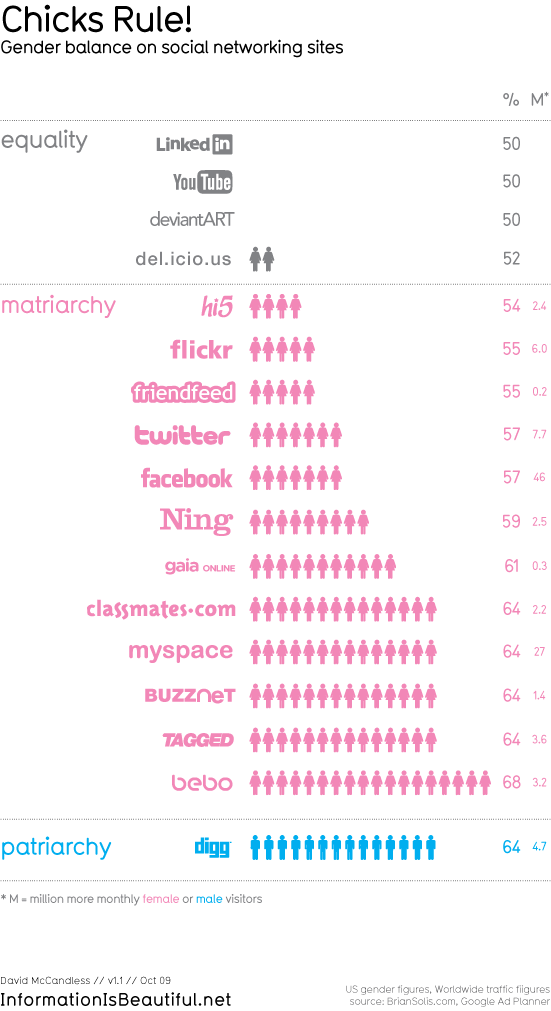Gender and Social Networking
“The world’s gone social. And women are more social than men.”
Facebook COO Sheryl Sandberg Forbes article April 2010
Data
Recent studies have revealed that women use social networking sites (SNSs) more than men. Data collected by Google Ad Planner in October 2009 from 19 different sites show that 53% of total users are women.
As the image below reveals, women make up the majority of users on the top sites such as Facebook, Twitter, MySpace, Bebo and Flickr. Both sexes use to an equal extent more content-based sites such as LinkedIn and YouTube. However, men dominate social news sites, such as Digg, where they represent 64% of total users.Google Ad data on briansolis.com Oct 2009
 Facebook, the world’s largest and most popular social networking site, does not only have a majority of female users (57%) but women have also been proven to be more active on the site: on average they have 8% more “friends” than men and carry out 62% of sharing information and photos.Forbes article April 2010
Facebook, the world’s largest and most popular social networking site, does not only have a majority of female users (57%) but women have also been proven to be more active on the site: on average they have 8% more “friends” than men and carry out 62% of sharing information and photos.Forbes article April 2010The typical MySpace user is apparently female, 21, single, with a public profile with a list of predominantly female “friends”.Paper on social networks and gender by M.Thelwall
Data collected by ComScore in 2010 confirmed these tendancies in a global report entitled “Women on the Web: How Women are Shaping the Internet”. This report unveiled that, across the world, a higher percentage of women use social networking sites than men. 75.8% of all women with access to the internet logged on to a social networking site in May 2010, compared to 69.7% of men. Women also seem to spend more time on these sites than men, an average of 5.5 hours a month compared to 4 hours for men.ComScore data 2010
Mobile social networking
Over the past few years, social networking has become mobile with the advent of smartphones. A study carried out by Nielsen in December 2009 revealed a distinct gender gap with regards to this activity as well. Their research indicated that women make up 55% of mobile social networkers.Mobile Social Networkin report, Nielsen 2009
Usage
It would seem that women and men also use social networking sites differently. Whilst women use these sites to socialise, make connections and share aspects of their personal life, men are more interested in obtaining information and increasing their status. Women are definitely more attracted to the discussion-based sites where they can express themselves, such as MySpace, Twitter and Facebook. However, by engaging themselves to a greater extent on social networking sites, privacy and security takes a back seat. Data has shown that women are more likely to disclose information about themselves, publicise photos and have low privacy settings.
References
External links
- Global Report by ComScore “Women on the Web”
- Forbes article April 2010 “What Men And Women Are Doing On Facebook”
- Brian Solis “In the World of Social Media, Women Rule
- Why Women Rule the Internet


